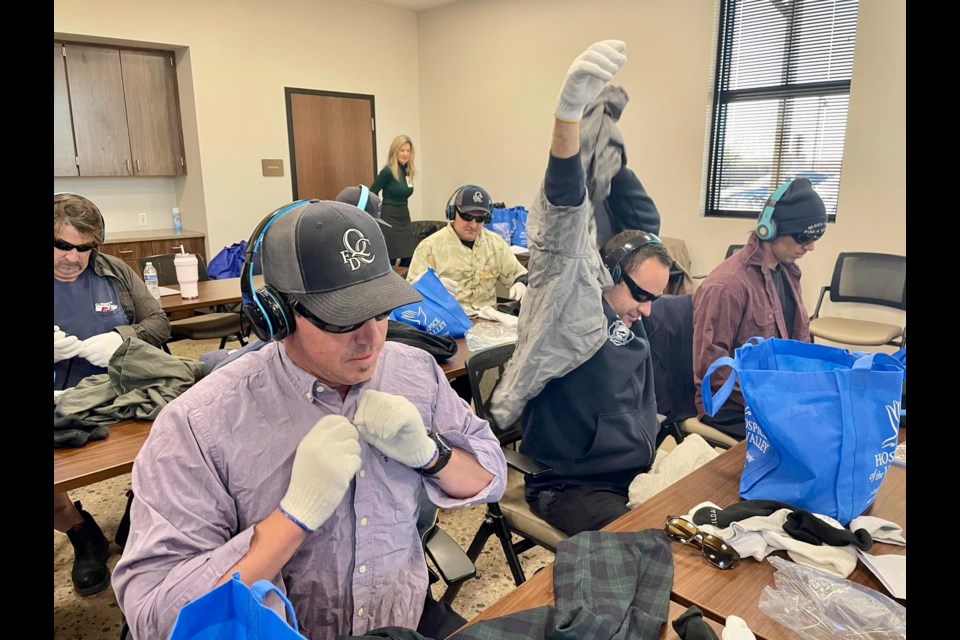It is estimated that over 7 million people in the United States have some form of dementia. Arizona’s large senior population means incidence of dementia is higher here than in most states. There are 150,000 Arizona residents currently living with Alzheimers and many more suffer from other forms of dementia. Age is the greatest risk factor for dementia – with most cases occurring in individuals over 65. While dementia for younger individuals is much rarer, it does happen and is referred to as early onset dementia.
Hospice of the Valley recently partnered with the Queen Creek Fire and Medical Department for an interactive training opportunity that showcases the challenges faced by people living with dementia.
"Hospice of the Valley has educated Gilbert, Phoenix, Scottsdale police and fire... and many other city departments. We started this Dementia Moments training to help first responders, as well as our whole community understand why people with dementia behave the way they do and how to approach and interact with them in a compassionate manner," said Lin Sue Flood, director of community engagement at Hospice of the Valley. "It is an eight-minute simulation exercise that mimics the daily challenges that people with dementia face due to brain changes – it's harder for them to communicate and express their feelings. Dementia Moments inspires understanding and empathy as participants experience the world from that perspective."
The Queen Creek firefighters who signed up for the exercise experienced hands-on training from Hospice of the Valley. They learned firsthand how dementia can profoundly impact language and comprehension and make it difficult for people to interpret what is happening around them. This training, which took place at Queen Creek Fire Station 4, helped the local first responders learn to help the community better care for loved ones living with dementia.
"With more multi-generational families moving into Queen Creek our firefighters are responding to more calls for help that involve those living with some type of dementia. This training really allows them to understand the challenges the patient might be facing and gives them a better understanding of how to help address some of those challenges so we can get them the best care possible," said Queen Creek Fire and Medical Department Chief Vance Gray.
During the two-week training, the firefighters wore specialized gear and went through simulations to help them understand what someone with dementia or Alzheimer's disease may be experiencing. The training helps them be more compassionate while responding to calls involving those living with dementia.
Wearing sunglasses that diminish vision, gloves that simulate neuropathy and headphones that are blaring static into their ears, firefighters were then given instructions to perform simple tasks such as counting coins or buttoning a shirt. This training by Hospice of the Valley enhances compassion of first responders when they respond to calls involving someone with dementia.
“Brain changes caused by dementia make it difficult for people to understand, process and respond to the world around them,” explained Kobie Chapman, a dementia educator with Hospice of the Valley. “We are out here with Queen Creek Fire and Medical to equip them with the tools they need to understand what that’s like. And we do it with this little blue bag.”
For first responders walking into crisis situations where emotions are high, it’s critical that they know or recognize when someone has dementia and is communicating differently.
“Short-term memory isn’t there, so people with dementia may forget you are standing behind them,” Kobie said. “If you startle them by approaching from behind, you could create an unsafe situation with someone who is already combative or agitated. You could get punched.”
Firefighter Jason Pridie wasn’t sure what to expect when he signed up for the training, but believes it will make him more empathetic going forward.
“To have that little bit of understanding of what they might be feeling will help me take it slow, show a little more patience and approach things differently,” he said.
Firefighter Peter Minder agreed.
“There was a lot going on and it was hard to focus on the task that was given,” he said. “I definitely will relate to dementia patients better after being in their situation, in a sense.”



